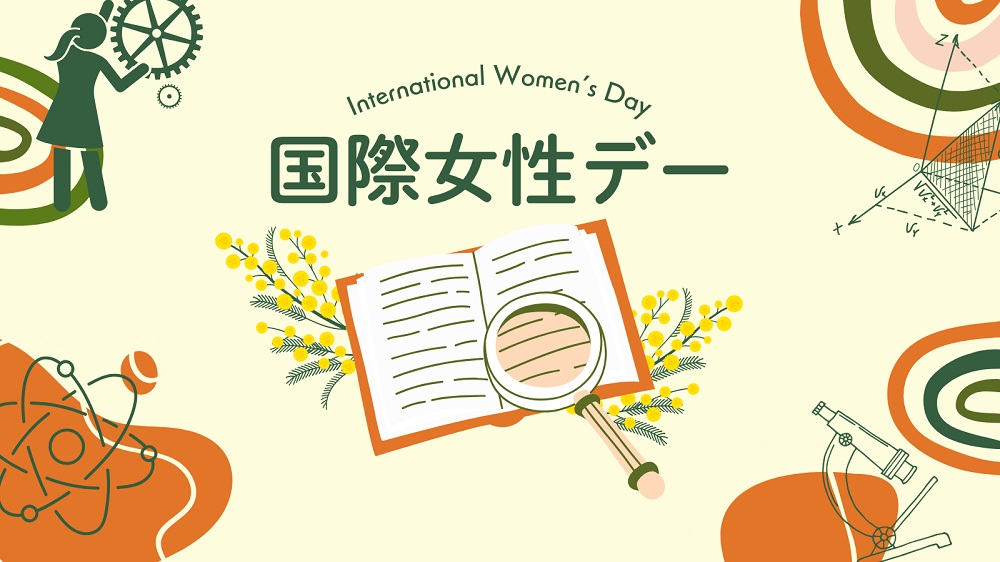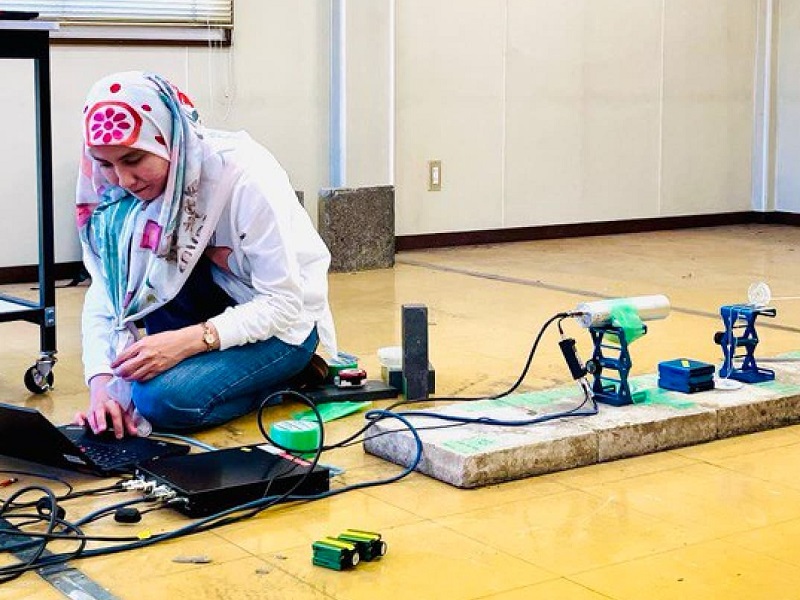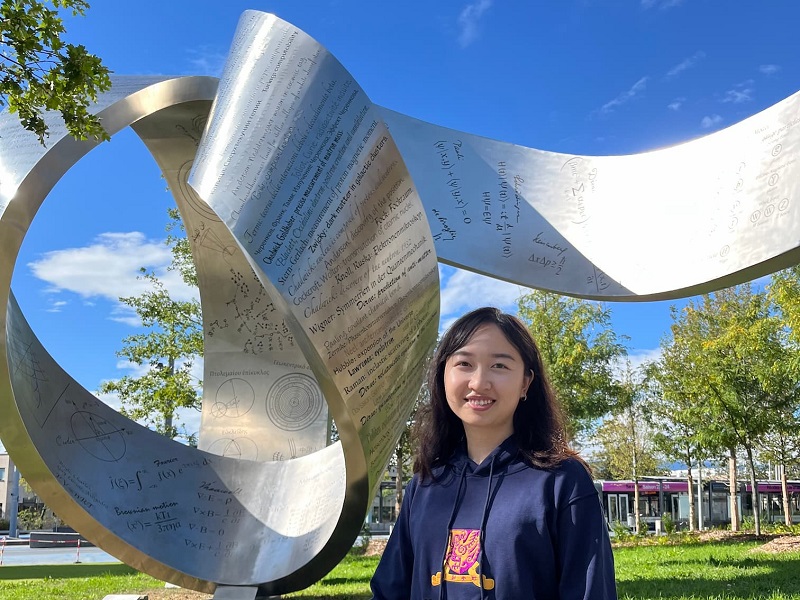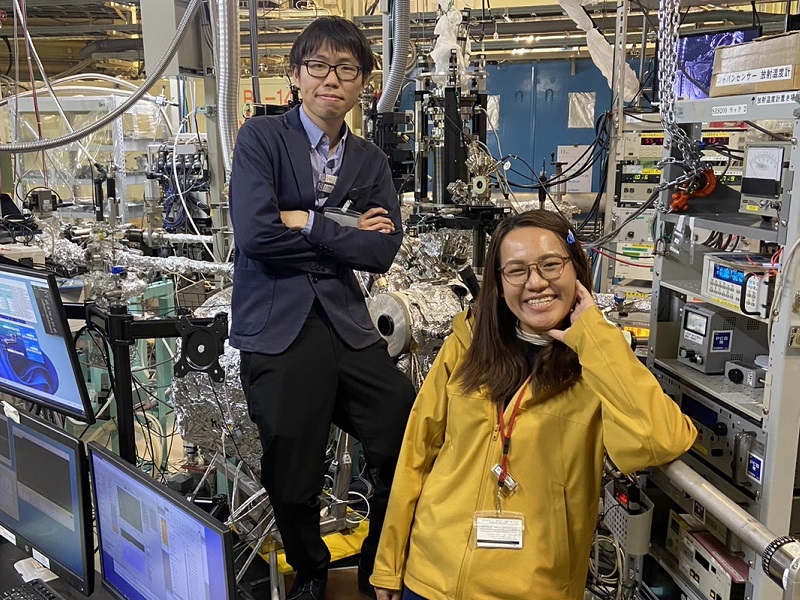
KEK has been conducting an “ATHENA” program to accept young overseas researchers every year. That provides young and mid-career female researchers from the Asia-Pacific region with opportunities to conduct collaborative research in Japan’s cutting-edge research facilities and research environments to help their career development and nurture the seeds of long-term collaborative research.
This program was launched in 2013 by the Physical Society of Japan following the Asia-Pacific Physics Congress (APPC12) held in Japan.
Except for the suspension due to the COVID-19 pandemic, a couple of female researchers stay at KEK for several weeks every year and conduct research under the guidance of KEK faculty members. Some past ATHENA program participants have enrolled at the Graduate University for Advanced Studies (SOKENDAI) and are working as researchers.
To celebrate International Women’s Day on March 8, we present interviews with three female researchers awarded in 2023.
Ms. Adila Hanim binti Aminordin Sabri (Sultan Zainal Abidin University (UniSZA) Malaysia)

Q: What led you to visit KEK for scientific research?
A: I participated in the ATHENA program from October 16th to November 2nd, 2023. My research focuses on the most significant sources of scattered radiation around the patient’s location, which are the surrounding walls and floor. The limited availability of amenities at my location, in contrast to KEK, motivated me to engage in this program. Additionally, one of the grounds that compelled me to participate in this program is Japan’s reputation as an advanced nation in the domain of radiation.
Q: What was your experience working at KEK?
A: Throughout my visit, I acquired knowledge regarding the measurement and simulation of gamma rays, which directly pertains to my research. Furthermore, I had the opportunity to visit iBNCT and Tohoku University (Cyric) with the purpose of acquiring knowledge on cutting-edge technology pertaining to the medicinal utilization of radiation. During the measurement program, I acquired proficiency in operating a CeBr3 scintillation spectrometer and successfully established the necessary configuration to accurately quantify the indirect gamma-ray contribution within the spectrometer. I also went to the KEK accelerators to see and learn about the ongoing projects being run by KEK.
Q: Did you face any challenges during your stay?
A: During my involvement in this program, I had no issues at all. Obtaining halal meals during participation in this program poses no difficulty, since there are plenty options available Transportation is not an issue as KEK offers bicycle rental facilities. The staff at KEK exhibit a highly welcoming and helpful approach, making the participation in the ATHENA program a thoroughly pleasurable experience.
Q: What’s your takeaway from this research experience?
A: The research experience I acquired from this program was quite beneficial. During my tenure in this program, Prof. Toshiya Sanami and Dr. Kim Tran Tuyet provided invaluable assistance in conducting the experiment, guiding me from a state of complete unfamiliarity to successfully obtaining the data. The insights provided by specialists during this seminar are really important. Also, if I have any queries about research after the program ends, I can still get in touch with the KEK experts.
Q: Life in Japan beyond the lab:
A: Coming to Japan, particularly KEK, presents a remarkable chance for conducting study and is also the optimal choice for immersing oneself in the atmosphere, exquisite natural surroundings, and distinctive cultural experiences. Even when traveling alone, Japan provides me with a sense of security. The culture also instills in me a desire to revisit Japan.
Ms. Tong Pan (The Chinese University of Hong Kong)

Q: What led you to visit KEK for scientific research?
A: It was an honor when I was chosen for the Fellowship Program for Young Female Researchers in Asia-Pacific Countries, also known as the “Athena Program”. This opportunity provided me with the chance to delve deeper into the world of super-symmetric particles. When the chance to collaborate with Associate Professor Soshi Tsuno emerged, it was an offer I couldn’t refuse. KEK, with its reputation for being a hub of advanced research, became our meeting ground. Adapting to a new country and a rigorous schedule was initially challenging. The unfamiliar surroundings and cultural differences occasionally made me yearn for the comforts of home. However, the genuine warmth of my colleagues at KEK quickly made me feel integrated and valued.
Q: What was your experience working at KEK?
A: Being selected for the Athena Program and having the opportunity to work at KEK was a profound and enriching experience. The research task for this program is the search for super-symmetric particles, particularly in the same-sign dilepton events through Majoranagluino. Although I had previously gained significant experience in physics analysis with the ATLAS collaboration, my familiarity with super-symmetric particles and the specific research areas at KEK was limited. This is where Associate Professor Tsuno’s invaluable guidance came into play. His generous mentorship enabled me to delve deeply into the research. I was directly involved in data reconstruction, selection, and analysis. Our combined efforts culminated in some truly interesting results.
Q: Did you face any challenges during your stay?
A: Indeed, while the work was exhilarating, there were days when I felt overwhelmed. Being away from my family, adjusting to a new country, and the demanding nature of the research did take a toll on me occasionally.
But, the biggest challenge was the language barrier. While many researchers spoke English, day-to-day interactions sometimes posed difficulties. However, I took this as an opportunity to learn basic Japanese. Plus, thanks to translation apps and the warm and hospitable Japanese people, I never felt entirely lost.
Q: What’s your takeaway from this research experience?
A: Working at KEK through the Athena Program has been a career-defining experience for me. The insights I gained on super-symmetric particles, combined with the personal growth I experienced, have shaped me both as a researcher and an individual. The spirit of collaboration, the state-of-the-art facilities at KEK, and the support of the Athena Program have made this journey unforgettable. I am now more motivated than ever to continue my quest for knowledge and to inspire other young female researchers to reach for the stars.
Q: Life in Japan beyond the lab:
A: Outside of the laboratory, I enjoyed my life in Japan. One of the highlights of my stay was attending the Tsukuba festival. There, I experienced the traditional dance called “bonodori” – a beautiful confluence of music, rhythm, and community spirit. Such festivals capture the heart and soul of Japan and allowed me to connect on a deeper level with the local culture. Furthermore, my sightseeing adventures led me to the iconic Senso-ji temple. Standing amidst its historic splendor, I felt a profound sense of serenity, reminding me of the timeless beauty and depth of Japanese culture. During my stay, I also enjoyed the local food both inside and outside KEK, and by the way, Ramen undoubtedly claimed the top spot on my list!
Ms. Chutharat Yonchai (Synchrotron Light Research Institute)

Q: What led you to visit KEK for scientific research?
A: Firstly, I would like to express my sincere appreciation to Professor Nobuhiro Kosugi and Associate Professor Kenichi Ozawa, my advisor, for invaluable guidance, and I would like to express gratitude to the ATHENA PROGRAM for providing the opportunity to visit KEK for fascinating scientific research at KEK. My interest in X-ray Photoelectron Spectroscopy (XPS) led me to BL-13B, Photon Factory (PF), KEK. I had previously worked at BL5.3 XPS, Synchrotron Light Research Institute, Thailand, where operated as a stand-alone machine, I have worked at the BL5.3 XPS station for several years after getting the Master’s degree, and I wanted to get a Doctor’s degree in the same research field in Japan. Then, I sent an e-mail to Professor Kosugi, the director of IMSS, and asked him to connect with the person in charge of photoelectron spectroscopy at PF, namely, Associate Professor Ozawa. Then, I had the opportunity to join study at BLs13B, 28A, 2B and 3B which specializes in micro photoemission. In this study, micro-X-ray photoemission spectroscopy (μ-XPS) measurements using soft X-rays were performed at BL-13B to elucidate the interaction mechanism between the Pd (palladium)-Rh (rhodium) alloy and CO2 molecules.
Q: What was your experience working at KEK?
A: My experiences at the KEK beamlines and photon factory have been both enlightening and transformative. Throughout my time spent on the beamlines, I gained valuable insight into the experimental techniques employed in the study of energetic particles. Working with researchers and experts in the field expanded my knowledge as well as my practical skills. One of the highlights of this learning experience was the opportunity to contribute to an ongoing research project. Working with a group of enthusiastic scientists allowed me to apply theoretical concepts to practical experiments and to strive for a better scientific understanding. Furthermore, the guidance I received from the beamline research team was invaluable. Their guidance and willingness to share their wealth of knowledge enriched my learning journey and provided a solid foundation for my future endeavors in this field. In short, my experience at KEK will undoubtedly shape my future pursuits in scientific research.
Q: Did you face any challenges during your stay?
A: During my participation in this program Working with many researchers, travelling, housing, food, and culture, I had no problems at all. Because everyone at KEK exhibits a highly welcoming and helpful approach. But there will be a slight language problem. This isn’t a problem for me because I consider it an opportunity to practice the language and learn at the same time. Makes participating in this program a very good experience.
Q: What’s your takeaway from this research experience?
A: The research experience I acquired from this program was very helpful. During this program, Assoc. Prof. Ozawa and Mr. Kenita Hiromori provided invaluable assistance in conducting the experiment, guiding me from a state of complete unfamiliarity to successfully obtaining the data. The insights provided by my advisor during this seminar are important. My experiences at KEK would shape my future scientific pursuits. And I will be able to help revitalize the synchrotron community in Thailand through my activities. Also, if I have any queries about research after the program ends, I can still get in touch with the KEK experts.
Q: Life in Japan beyond the lab:
A: This is my first time coming to Japan, particularly KEK, presents a remarkable chance for conducting study and is also the optimal choice for immersing oneself in the atmosphere, exquisite natural surroundings, and distinctive cultural experiences. I ate authentic Japanese food at a local restaurant, I really like Japanese cuisine. The beautiful nature of Japan, where I traveled to Mount Tsukuba. I participated in activities such as cleaning campaigns in the area around KEK, went shopping, and visited the department store to buy souvenirs for family and friends in Thailand. I traveled to Tokyo using very convenient public transportation system. Life outside the lab in Japan is always like an experiment. I had a very beautiful experience.”
